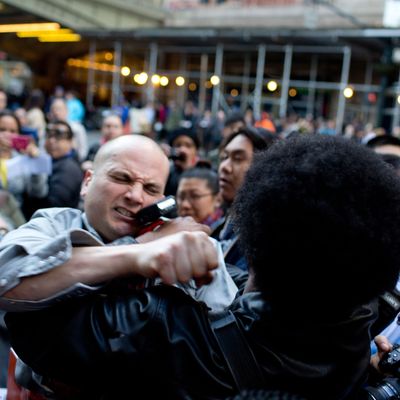
It’s understandable why some people are concerned that there will be violence during or immediately after tomorrow’s presidential election. After all, for the entire final stretch of the campaign, Donald Trump has been pre-complaining that the results of tomorrow’s election will be “rigged,” and has repeatedly refused to say that he will accept the results, full-stop (well, he did say he’ll accept them if he wins). And while one can’t necessarily take the craziest things a given candidate’s supporters say at face value, some of his supporters have spoken openly and excitedly about the possibility of violence and revolution.
In a country as big as the U.S., with so many different polling places, the odds that there will be no isolated instances of violence tomorrow are pretty low. But should we be worried about more widespread violent conflict? One expert doesn’t think so.
“People are both vastly and incorrectly overstating the prospects for electoral violence here,” Susanne Mueller said in an email. Mueller is a political scientist currently based at Boston University’s African Studies Center, and a widely published expert on the Kenyan political system, which produced one of the more infamous recent examples of election violence. “In the winter of 2007,” The Atlantic’s Olga Khazan wrote in 2013, “machete-wielding mobs marauded around the Kenya, hacking rival tribes to death and burning women and children alive. In all, more than 1,300 people died and 600,000 people were displaced in the violence that followed the country’s previous election.”
Mueller spent 20 years living in Kenya and conducting research both there and in various other countries in eastern and southern Africa. Since one of her areas of research is election violence, she has developed a strong sense of what the necessary preconditions are for it. She doesn’t think the U.S. meets any of them, she explained in her email:
1. We have strong institutions with separation of power among the executive, legislature and the judiciary. Kenya has/had historically weak institutions with strong executive control and more nominal than real separation of power.
2. The U.S. does not have a history of electoral violence. Kenya and many other countries do.
3. In the U.S. both the public and the person who loses have confidence in the integrity of the electoral system and accept wins and loss. That does not mean there never are any problems but they are not widespread. In Kenya there is little confidence in the integrity of the system, election violence since competitive elections were allowed once again in 1991 has happened often, and losers often question the results, rightly or wrongly.
4. If Trump’s call of “rigging” became an incitement to violence, I expect it would be very isolated and the police would step in immediately, plus as he says everything is rigged when the polls are not going his way, he does not have a great deal of integrity.
The interplay between points (3) and (4) here seems particularly important. After all, it wouldn’t be shocking if Trump played the rigged card. But … then what? For that to lead to sustained violence, his supporters would then need to foment some sort of violence, and it would need to be the case that police didn’t step in to quickly arrest them wherever this occurred. That seems a lot unlikelier in the U.S. than it does in countries with weaker institutions, partly because potentially violent people, in weighing the decision of whether or not to express their frustration in such a manner, know that authorities won’t stand for it.
Does this mean widespread and/or sustained violence is impossible tomorrow? Of course not. But whereas in Kenya in 2007 all the conditions were right for that to occur, it seems like it would take an extremely unusual turn of events for that to happen in the U.S.




